Mexico's Crusade Against Hunger
The idea that global food businesses can be useful partners in hunger campaigns took a bizarre turn in April 2013 when the Mexican government launched a Crusade Against Hunger.
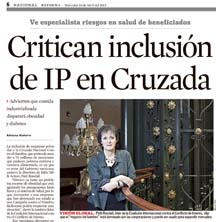
Baby Milk Action's Policy Director Patti Rundall was invited by El Poder del Consumidor (Consumer Power) to a series of meetings with Senators, Parliamentarians and the media to raise awareness about Conflicts of Interest.
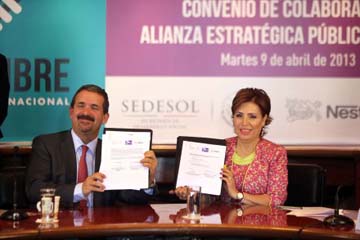
We were about to congratulate the Secretary for Development, Rosario Robles, for including breastfeeding protection in the Crusade when two partnerships were announced, before any academics or NGOs had been consulted. Among other worrying ideas, Pepsi would provide fortified formulas for pregnant and nursing mothers and Nestlé (above) would create a programme called Mi Dulce Negocio Nestle (My Sweet Business). This would involve teaching 15,000 women how to sell desserts and give nutrition advice in Mexico’s poorest regions.
While Nestle’s plan is the last thing the world’s largest junk food company should be doing - Pepsi's scheme could be even more dangerous. We know formulas for mothers undermine women's confidence in breastfeeding and have been used by other companies such as Fonterra to pave the way for the introduction of formulas for babies. (See ICDC Briefing on Fonterra page 25.)
About half of Mexico’s 115 million population is classified as poor, with about 12 million of those living in extreme poverty. But Mexican people also have one of the world’s highest rates of obesity and diabetes – diseases that are largely driven by the marketing of ultra-processed foods. Instead of helping small farmers and producers, the Crusade will empower large corporations and facilitate the penetration of their unhealthy foods deeper into the Mexican market, under the perfect philanthropic guise of conquering malnutrition. The scheme also threatens Mexico’s unique food culture and ecosystem, which has been declared by UNESCO as an Intangible Cultural Heritage of Humanity.
Alvaro Urreta Fernandez, President of the Union of Producers and small merchants, Mexico City, said: "The uncontrolled growth of these multinational corporations has a negative economic and social impact, harming small producers of fruits and vegetables, encouraging an increase in the consumption of junk foods and dramatically decreasing the consumption of fresh fruits and vegetables."
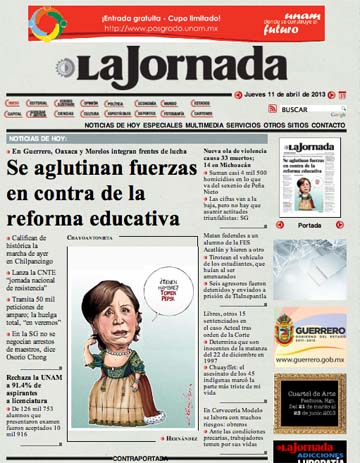
Some of the 50+media reports on the criticism of the Nestllé/Pepsi deals. From top: El Reforma, Marcelo Melchior, President of Nestlé Mexico, and Rosario Robles, Secretary of Social Development signing the deal; Cartoon of Robles in La Jornada - showing her dressed as Marie Antoinette saying "Are you Hungry? Have a Pepsi."
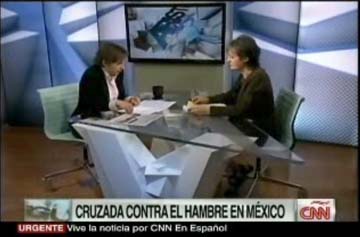
Patti Rundall being interviewed by Carmen Aristagui on CNN. April 2013.
International and national NGOs join forces
The media coverage helped raise awareness among NGOs. A petition, organised by LLL Mexico, quickly attracted 3,000 signatures. LLL also joined 10 other leading international NGOs such as the International Obesity Task Force, ILCA, IBFAN and Consumers International in an open letter to President Nieto, placed in 2 major newspapers. Meanwhile Mexican NGOs are organising Policy Forums and media events, keeping the issue alive. 27 NGOs met Javier Guerrero, the National Vice Coordinator of the Crusade in Chiapas, expressing unanimous opposition to the corporate involvement. Later the National Institute of Nutrition met Secretary Robles and asked her to support three proposals: access to potable water; a healthy market system with local products that are not processed and legislation to protect breastfeeding, insisting that the proposals are carried out independently of the companies.
Secretary Robles welcomed the ideas and as we go to press has also agreed to discuss the international concerns with Patti Rundall. Let’s see....
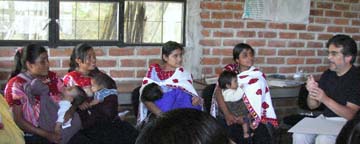
Dr Marcos Arana, of the National Institute of Nutrition and IBFAN Latin America’s Policy Council, with young mothers in Chiapas, where the infant mortality rate is, according to some estimates, as high as 27 per 1000.
"Nestlé's plan to train 15,000 women to sell desserts and do education could represent one of the biggest violations of the International Code and Resolutions. Direct or indirect contact with mothers is forbidden by the Code for very good reasons. In my region of Chiapas, every day I see how bad infant feeding results in malnutrition and infant deaths."
Mexico’s breastfeeding rates are appalling. From 2006-2012, exclusive breastfeeding under six months decreased from 22.3-14.4%, with a 50% drop in rural areas [ENSANUT 2012]. Small wonder when many key aspects of the International Code are voluntary, health claims abound, in some private hospitals less than 4% of births are normal, babies are routinely separated from their mothers and free/low-cost supplies of formula continue on a rotation system. There is just one Baby Friendly Hospital in Mexico City!
Brazil’s Zero Hunger strategy
The inspiration for the Mexican Crusade was said to be Brazil’s Zero Hunger strategy. However several critical points were ignored: namely that it was a fully thought-out development agriculture programme that followed extensive consultation with civil society. Public policies were in place to protect and strengthen breastfeeding and food systems and only civil society and government representatives - not conflicted industries - took part in its policy design and implementation. As a result, the national school feeding program is 100% publicly funded, with at least 30% of the food purchased from local producers at least 70% unprocessed products. Because of industry lobbying some conflicted industries are involved, but so far to a limited extent.






